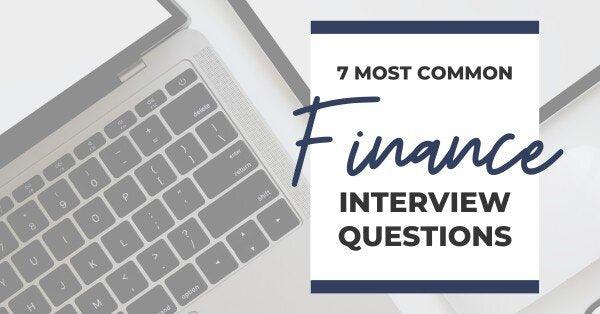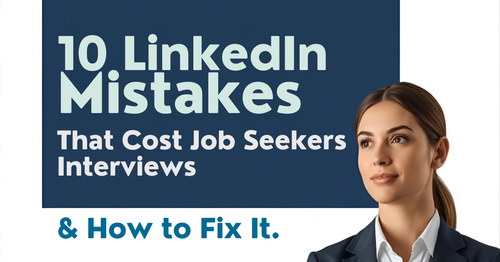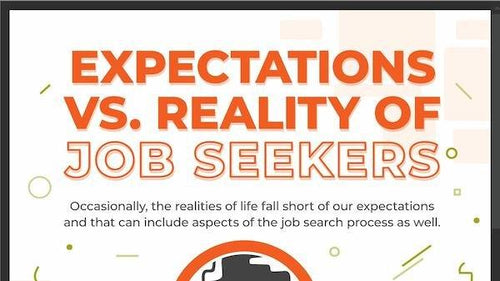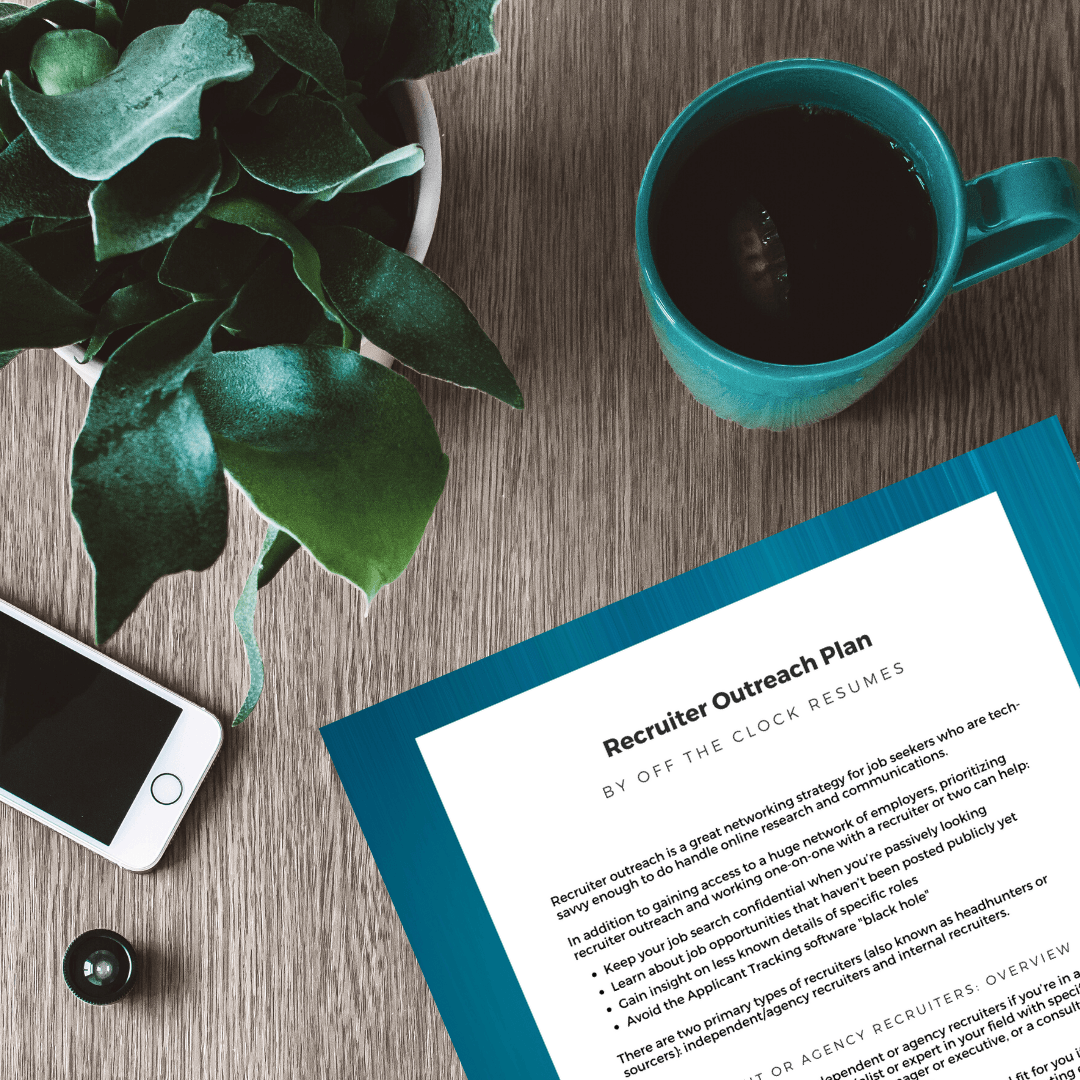
7 Most Common Finance Interview Questions
Preparing to interview for a job in finance?
Finance and accounting are very rewarding fields with a great outlook and a lot of upward mobility. But first, you’ve got to get in the door. To help you be more prepared, here are seven of the most common finance interview questions!

This blog contains affiliate links, meaning I may receive a small commission (at no cost to you) if you subscribe or buy something through the links I share. I only share links to products or services that I use myself or absolutely love!
1 | If you could only use one financial statement to assess the health of the company, which one would you choose and why?
This is a great question because it can reveal a lot. There isn’t really a right or wrong answer—and it’s highly recommended to use all of the statements to assess a company—but it lets you show your knowledge of financial statements as well as what you find to be the most important measurements for a healthy company.
Depending on the industry, and the company itself, there are crucial insights to gain from each statement. Some industries/companies place a high value on cash flow and need it to be in good shape. Others may need to focus on profit margins and cost management. And others are focused on leveraging their assets to drive profitability. You need to show that you understand the priority of the company and the overall needs in the industry.
2 | Tell me about a high-stress situation you were in and how you handled it.
Finance can definitely be stressful at times. After all, you’re responsible to help make major decisions with serious consequences. Your prospective employer will want to know how you handle stress and that you can deal with the work environment you’re likely to face.
Make sure you’re prepared for “fit” questions like this because finance interviews are likely to include them. They want to know if you’re well-suited for the job and for the company. Spend some time thinking about stressful situations, challenges, strengths, and weaknesses in advance so you have something to pull from during the interview.
These questions are also a great opportunity to tell stories about yourself. For instance, maybe you have a stressful situation in mind that’s related to finance or showcases a strength or skill you’re proud of. That’s a win/win.
3 | When should a company issue debt instead of equity?
Expect technical questions like this to test what you know and also to make sure your thinking lines up with the company. That’s not to say they’re looking for a department full of “yes people” but if they have a preference for doing things a certain way they’ll be looking for people who share the same values and priorities.
This question is an opportunity for you to talk strategy. Mention the variables that need to be taken into consideration, like cash flow, interest payments, tax shields, and the weighted average cost of capital for the company.
4 | Walk me through the financial statements.
You’ll probably hear a few questions like this, asking you to demonstrate knowledge of the basics. The interviewer wants to be sure that you understand finance and also that you can clearly communicate and present what you know.
Working in finance, you’ll need to not only analyze numbers but also share your analysis with people who... well... aren’t in finance. You can be sure they’re watching and listening to how clearly and confidently you communicate to see if you could do the same with crucial financial data.
Just for the record: The Balance Sheet shows assets, liabilities, and shareholder’s equity. The Income Statement shows revenues, expenses, and net income. The Cash Flow Statement shows cash inflows and outflows from operating, investing, and financing activities.
5 | How do you explain complex financial issues to team members in other departments?
Accounting and finance people have long enjoyed jargon-filled conversations about money. It’s like talking in a secret code or carrying on with your friends in Klingon. But, as we’ve seen, the finance function is changing. Finance professionals are being asked to play a more strategic role and with that, there’s an increased need to clearly communicate with people who don’t speak finance.
Not only is it important to prepare for a question like this it’s also critical to build your skills so you’re prepared to succeed in your new role.
6 | What’s the biggest financial challenge facing our industry today?
Employers are looking for prospects who understand finance, understand the industry, and have taken the time to research current issues. If you can demonstrate that you’ve put in the time to study you’ll be a step ahead of other candidates.
7 | If you were CFO, what about our company would keep you up at night?
Questions like this go beyond the basics of understanding finance. You’re not going to find the answer by mentally retracing your steps through your finance textbooks. This is partly a test of how well you apply your knowledge to real-life situations. More than that, though, it’s a test of how well you know the company and how much time you spent doing your homework on your prospective employer.
So... make sure you do your homework.
You should have examples of what to watch for and what to worry about on each financial statement, specific to the company if at all possible. If you don’t have specifics for the company that’s interviewing you, at least make sure you’ve studied the industry to see what trends and issues are relevant and what to look for.
Conclusion
If you want to ace your finance interview, make sure you’ve got the fundamentals down pat. Then take the time to think about your own strengths, weaknesses, and previous experiences so you’re not caught off guard when asked about yourself and how you fit with the company culture. Finally, take the time to research the company you’re interviewing with and the state of their industry.
You’ve got this. Best of luck and we’ll see you on the other side.
Related Articles
-

10 LinkedIn Mistakes That Cost Job Seekers Interviews (How to Fix It)
Guest blogger outlines how to avoid these LinkedIn mistakes to drastically improve your chances of being noticed, whether you’re actively job hunting or just trying to grow your professional presence.
-

Guide To Choosing A Career In SaaS
Thinking about a career in SaaS? Guest blogger Jacob Wickett shares top roles, key skills, and how to break into this fast-growing industry.
-

Mastering the Modern Workplace: Essential Skills for Career Growth in the Age of AI
Guest blogger Sadie Smith shares a comprehensive guide to help professionals navigate unprecedented changes driven by technological advancement with confidence.
-

Navigating Your Career Path with a Family Nurse Practitioner Degree Program
Guest blogger Sadie Smith reveals how strategic planning in your healthcare career broadens your impact on patient care and community health.
-

Career Transitions: Navigating Your Path to Success in Healthcare and Beyond
Guest blogger Sadie Smith shares how to leverage your existing skills and experience while pursuing new career opportunities in healthcare and other industries.
-

Breaking Barriers: A Guide to Empowering Women in Manufacturing Leadership
Guest contributor Sadie Smith shares this comprehensive guide on how women can reshape the manufacturing industry landscape with actionable insights.
-

Navigating An Evolving Job Market With Strategies For Success
To thrive in a dynamic job market, you need to continuously adapt your job search strategies. Stay informed and flexible to position yourself for success.
-

4 Personal Assistant Interview Questions and Answers
Guest blogger Liza Griffen, co-founder of Tyler Griffen, equips you with a deep understanding of typical interview questions and practical answers to help you showcase your skills effectively whether you're aiming to impress in your first personal assistant role or looking to step up in your career.
-

Crack Your Dream Company Interview
Guest contributor Nandkishore Rathi shares practical tips, strategies, and insightful advice from career experts to help you shine during written and verbal interviews.
-

Exploring The Realities Of Job Hunting (Infographic)
Guest contributor Joseph Matalone delves into common expectations in job seeking and the contrasting realities.
-

Don't Panic: 15 Ways To Prepare For A Video Interview
Guest blogger Daniel Boyce with Aware Recruiter delves into 15 actionable steps to prepare you for a stellar video interview experience whether you're a seasoned professional or just stepping into the job market.
-

5 Signs That A Company Values Employee Wellness And Safety
Guest blogger Sharon Feldman shares how asking questions about wellness and safety in your interview could give you insight into a company’s values.
-

Can An Employer Fire You For Being Sick?
Many employers can terminate an employee for falling sick frequently. Guest blogger Natalie Padilla shares all you need to know regarding being fired by an employer.
-

Tips On Building A Positive And Supportive Workplace
Guest blogger Adam Blacksmith shares how to embrace communication, celebrate diversity, and empower your team for success by fostering a positive and supportive workplace culture.
-

AI: Transforming Networking, Interviews, and Careers
Guest Author, Dean Fankhauiser. discusses how AI is revolutionizing networking, interviewing, career planning, and professional advancement.
-

Preparing for Different Interview Formats: Phone, Video, and In-Person
Interview Coach Ellie Hoekman shares specific preparation steps for phone, video, and in-person interviews.
-

Negotiating A Competitive Salary
Guest blogger Rohan Singh shares strategies for negotiating a fair salary that reflects your worth and fulfills your goals.
-

Can My Employer Ask Why I’m Taking A Sick Day?
Guest blogger Samantha Larson shares whether your employer has the right to ask you why you are sick and how much information they are entitled to when you take a sick day at work.
-

The Benefits of Coaching in the Workplace
Guest blogger, William Powell, shares some of the concrete examples of the benefits associated with employee coaching.
-

10 Facts & Stats About Sexual Harassment in the Workplace
Guest blogger Sharon Feldman shares how many people experience harassment every day, including at their place of work, to increase awareness.
-

The Ultimate Temping Guide for Beginners
Guest blogger Auria Heanley with Oriel Partners shares insight into what a temp job is and what to expect in order to make the most of a new job opportunity.
-

High Paying Career Paths After Learning Python
Guest blogger Rose Young with Codebasics.io shares some of the promising career paths you can explore after learning Python programming.
-

How To Ace Your Interview With A Staffing Agency
Guest blogger William Powell shares how to prepare adequately for an interview with a recruiting agency to increase your chances of landing your dream job.
-

How Do You Know When It's Time To Quit Your Job?
Guest blogger Katie Meyers shares when quitting your job is the right thing and how to go about it.
-

5 Things You Need To Know About Job Interviews To Succeed
Guest blogger Marcus Ralph shares 5 tips on what you can do before a job interview to be best prepared to make a solid first impression and land the job.
-

Know Your Worth and Add Tax: How To Effectively Negotiate Your Salary
Guest blogger Jeffrey Cassells with Shegerian Law advises that it's time to learn how to negotiate strategically and not settle for being underpaid, whether you're at your first or fifth job.



























